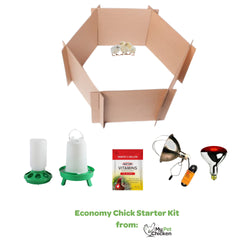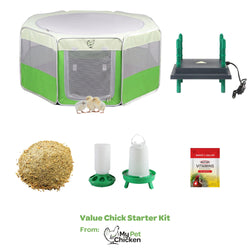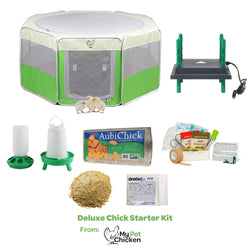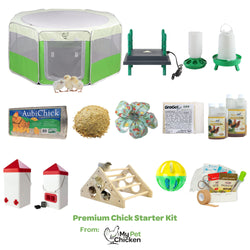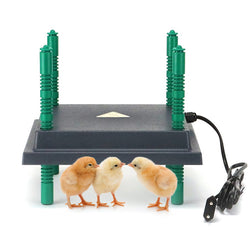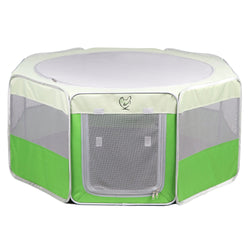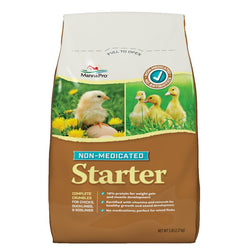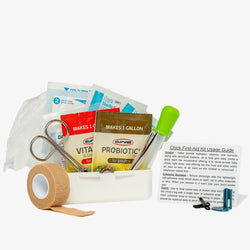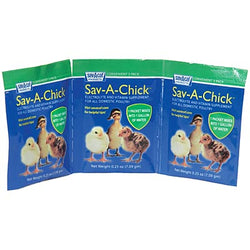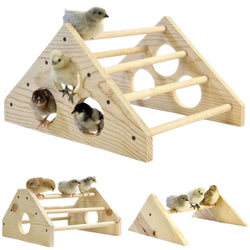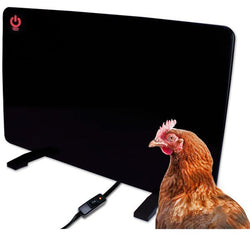All about Aspergillosis disease
Back to blog
Keeping your brooder and coop area clean and dry is essential if you want to protect your precious baby chicks and older birds from aspergillosis. Also known as "brooder pneumonia," baby chicks are especially vulnerable to the symptoms produced by the spores of the Aspergillus fungi that may grow in your brooder if it fluctuates between wet and dry conditions. Keep reading to find out more:
Aspergillosis Also called
Pneumonia, coop or brooder pneumonia, mycotic pneumonia, pneumomycosis
Prevalence
Infrequent
Signs
General signs -
Respiratory symptoms, including discharge from nares (nostrils) and/or eyes, loss of appetite, coughing, panting, gasping for air, occasionally intestinal disturbances (such as diarrhea), fatigue, torticollis
Cardinal or diagnostic signs -
None apparent before death, however your vet can discover which pathogen is causing the problem by producing a culture for examination
Cause/s
Mold spores from Aspergillus genus fungi
Communicability
Not passed from bird to bird; typically the spores develop in wet conditions, then are inhaled in dry, dusty conditions.
Communicability to humans
Not passed from bird to human, but humans, typically those with suppressed immune systems, can become infected with aspergillosis by breathing in spores.
Incubation period
Unknown
Latent
Some birds can suffer from chronic (long term) aspergillosis rather than acute aspergillosis; however, symptoms are apparent, and your birds don't become symptomless carriers.
Endemic
This can happen in any environment, but is more common in factory farms and in flocks where the birds are highly stressed. It is also more common in coop or brooder conditions that alternate between wet and dry. (It has to be wet for the mold to grow, and dry for the spores to be blown in the dust.)
Home treatment and/or prevention
Prevention: Practice good biosecurity. Keep coop and brooder clean and dry. If litter gets wet, remove it before mold develops. If you hatch eggs at home, be sure to properly clean and sanitize your incubator between uses. Keep feed dry and waterers clean and sanitary.
Treatment: You may be able to try treatment at home with a vet's prescription.
Veterinary care
Your vet may be able to prescribe an antifungal medication; however, be aware that none are indicated for poultry at this time, so results may vary.
Recovery
Spontaneous recovery is possible, and treatment with medication is regarded as generally ineffective in chickens. That said, such statistics are generally reliant on data from commercial flocks, where factory farm owners are interested only in the least costly options, which in most cases is replacing sick birds. Possibly treatment in a small flock by a caring owner would give more promising results. There are treatments for humans, dogs, horses and other animals that get aspergillosis. (Please let us know if your vet prescribes something that works for your pet chicken.)
Other conditions, illnesses and/or diseases with similar signs:
Various other respiratory illnesses may appear similar, including infectious bronchitis, Newcastle, infectious laryngotracheitis, mycotic encephalitis, and nutritional encephalomalacia.
Also consider browsing through this list of other chicken illnesses with respiratory symptoms.
Aspergillosis Also called
Pneumonia, coop or brooder pneumonia, mycotic pneumonia, pneumomycosis
Prevalence
Infrequent
Signs
General signs -
Respiratory symptoms, including discharge from nares (nostrils) and/or eyes, loss of appetite, coughing, panting, gasping for air, occasionally intestinal disturbances (such as diarrhea), fatigue, torticollis
Cardinal or diagnostic signs -
None apparent before death, however your vet can discover which pathogen is causing the problem by producing a culture for examination
Cause/s
Mold spores from Aspergillus genus fungi
Communicability
Not passed from bird to bird; typically the spores develop in wet conditions, then are inhaled in dry, dusty conditions.
Communicability to humans
Not passed from bird to human, but humans, typically those with suppressed immune systems, can become infected with aspergillosis by breathing in spores.
Incubation period
Unknown
Latent
Some birds can suffer from chronic (long term) aspergillosis rather than acute aspergillosis; however, symptoms are apparent, and your birds don't become symptomless carriers.
Endemic
This can happen in any environment, but is more common in factory farms and in flocks where the birds are highly stressed. It is also more common in coop or brooder conditions that alternate between wet and dry. (It has to be wet for the mold to grow, and dry for the spores to be blown in the dust.)
Home treatment and/or prevention
Prevention: Practice good biosecurity. Keep coop and brooder clean and dry. If litter gets wet, remove it before mold develops. If you hatch eggs at home, be sure to properly clean and sanitize your incubator between uses. Keep feed dry and waterers clean and sanitary.
Treatment: You may be able to try treatment at home with a vet's prescription.
Veterinary care
Your vet may be able to prescribe an antifungal medication; however, be aware that none are indicated for poultry at this time, so results may vary.
Recovery
Spontaneous recovery is possible, and treatment with medication is regarded as generally ineffective in chickens. That said, such statistics are generally reliant on data from commercial flocks, where factory farm owners are interested only in the least costly options, which in most cases is replacing sick birds. Possibly treatment in a small flock by a caring owner would give more promising results. There are treatments for humans, dogs, horses and other animals that get aspergillosis. (Please let us know if your vet prescribes something that works for your pet chicken.)
Other conditions, illnesses and/or diseases with similar signs:
Various other respiratory illnesses may appear similar, including infectious bronchitis, Newcastle, infectious laryngotracheitis, mycotic encephalitis, and nutritional encephalomalacia.
Also consider browsing through this list of other chicken illnesses with respiratory symptoms.
